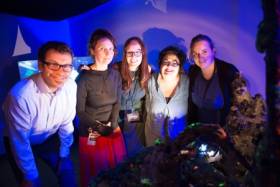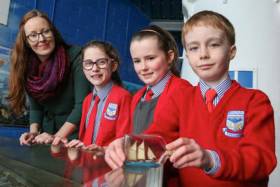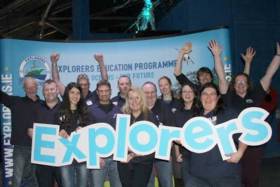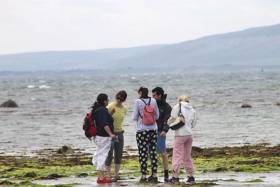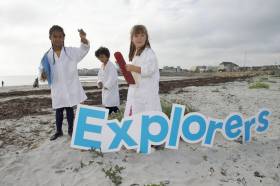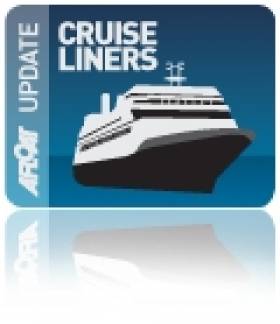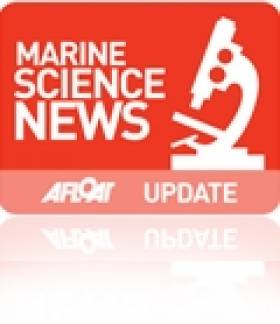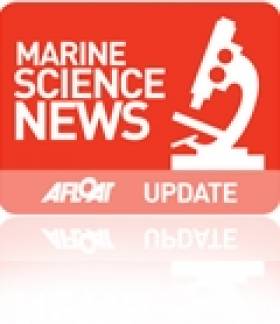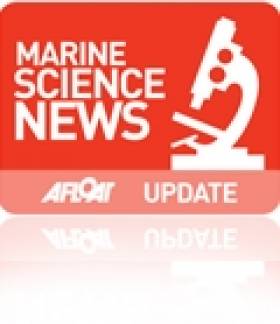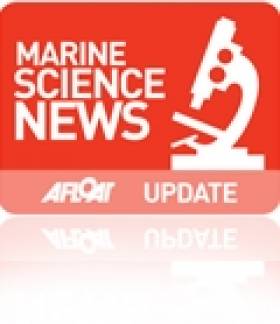Displaying items by tag: Explorers Education Programme
Primary School Marine Science Art Project Shortlisted For Top Award
#MarineScience - Build Your Own Unknown, a marine science and art project by fourth-class pupils at Cregmore National School in Co Galway, has been shortlisted for the Allianz Business to Arts Awards.
As previously reported on Afloat.ie, the Cregmore pupils worked with artist Louise Manifold to produce their installation and short film, using images and footage from the ROV Holland I for inspiration in recreating the discovery of the Moytirra deep-sea hydrothermal vents in 2011.
The project — which places art, marine science and technology in the heart of the classroom — also involved TULCA in partnership with the Marine Institute’s Explorers Education Programme and marine scientist Dr Andy Wheeler from UCC.
Marine Institute chief executive Dr Peter Heffernan congratulated the team on their achievement and wished them luck for awards night.
“One of the greatest outcomes of the Build Your Own Unknown project was being able to provide an opportunity for artists, marine scientists and educators to work together to help engage and increase children, teachers and the wider community’s awareness about the importance of our ocean,” said Dr Heffernan.
The Allianz Business to Arts Awards recognise and champion the spirit of collaboration between businesses, artists and arts organisations that develop creative partnerships; bringing the arts and artists into mutually beneficial relationships across society.
The winners of this year’s Allianz Business to Arts Awards will be announced later this evening (Monday 4 September).
#MarineScience - Fourth-class pupils from Cregmore National School in Co Galway are creating a marine science and art installation and short film with artist Louise Manifold that re-enacts the 2011 discovery of the Moytirra deep-sea hydrothermal vents.
Build Your Own Unknown sees the school children use images and footage from the ROV Holland I for inspiration to recreate the discovery of the gigantic rock formations, ‘smoking’ lava vents over 10m high, and areas teeming with unusual species new to science at the Moytirra vent field in the Mid-Atlantic Ridge, some 3km below the surface north of the Azores.
Louise Manifold, the local artist leading the project, said: "As an artist I have always been fascinated by relationship between science and cinema, where often our connections to ocean is formed through our childhood imagination, from sci-fi films to childhood games and mythical stories.
“Build Your Own Unknown is not only about understanding our connections to the ocean, but it is about valuing human curiosity, and I am really enjoying the opportunity to work with the pupils of Cregmore to make an amazing piece of work that celebrates this."
Supported through the Marine Institute's Explorers Education Programme and the Tulca OFFshore programme, the marine science/art collaboration is welcomed by Marine Institute chief executive Dr Peter Heffernan.
"This is an innovative opportunity for artists, marine scientists and educators to engage and increase our awareness about the value, opportunities and societal benefits that the ocean provides us,” he said.
"Rediscovering the mystery of the ocean through the eyes of a scientist, the children have been given the opportunity to work with the Institute and Dr Andy Wheeler from UCC, who was the chief scientist on the research vessel RV Celtic Explorer, that had explored and aptly named Moytirra vents after a mythological Irish battlefield meaning plain of pillars.”
Build Your Own Unknown will be on show at SeaFest 2017, Ireland’s national maritime festival from 30 June to 2 July, which will promote the importance of ocean exploration as well as engage the wider community through visual arts.
The project will also include the development of cross-curricular education lesson plans and resources that teachers will be able to use for their own art-science project module. These will be available later this year at www.explorers.ie.
15,000 School Children to Benefit from Marine Education Programme in 2017
The Marine Institute's has announced that over five hundred teachers and 15,000 primary school children will benefit from its Explorers Education Programme this year. Recent expansion in funding has enabled outreach centres in ten counties around Ireland, to triple the number of teachers and children being introduced to marine themes in the classroom.
Providing the opportunity to learn about the importance of engaging with the sea, and strengthening our marine heritage and identity, the Explorer education officers introduce marine biodiversity and marine environmental awareness and care into the class room through a range of exciting STEM marine based modules including aquariums in the class, seashore safaris, as well as marine projects and workshops.
Dr Peter Heffernan, CEO of the Marine Institute congratulated the new centres on a successful delivery of the Explorers Programme in the last six months saying "increasing our awareness and understanding of the value, opportunities and societal benefits the ocean provides us is key to sustainably developing Ireland's marine resource which is ten times the size of its land mass."
As the state agency responsible for marine research and innovation "we welcome the opportunity to work with educators to promote the development on our thriving marine economy as well as protecting and conserving our rich marine biodiversity," Dr Heffernan further said.
The need for education in the marine sector at all levels is highlighted by Ireland's Integrated Marine Plan Harnessing Our Ocean Wealth noting Ireland's marine sector is a vibrant part of our national economy. Ireland's Ocean Economy SEMRU, NUI Galway report states that Ireland's marine economy in fisheries and seafood production, maritime transport, marine tourism, as well as in emerging sectors and research and development has a turnover of €4.5 Billion annually, providing over 16,000 jobs directly and 13,000 related jobs in the general economy, providing an additional €3.3 Billion in turnover annually.
The centres representing the Explorers Education Programme™ were selected as part of a national procurement process and include Leave No Trace, Redrose Developments, Galway Atlantaquaria, Loophead Summerhedge School, Seasynergy Marine Awareness and Activity centre, Lifetime Lab, Oceanics Surf School and Marine Education Centre and SeaLife Bray. The centres are located in Sligo, Donegal, Mayo, Galway, Clare, Kerry, Cork, Waterford, Wicklow and Dublin. Free lesson plans, teachers resources and more information about the Explorers Education Programme™ is available at www.explorers.ie
The Explorers Education Programme is supported by the Marine Institute, and funded under the Marine Research Programme by the Irish Government.
New Marine-Themed CPD Course For Primary Teachers In Galway
#MarineScience - The Explorers Education Programme has recently launched a free continuous professional development (CPD) course for primary school teachers in the West of Ireland, which can be carried out during Croke Park hours.
The new CPD course provides an "exciting opportunity for teachers to develop interesting ways of introducing cross-curricular ocean themes into their school planning, class activities as well as seashore fieldwork,” said Dr Noirin Burke, education director at Galway Atlantaquaria.
The course uses a number of key education methodologies, including inquiry-based learning and fieldwork planning, that links to the national curriculum. The course is flexible in which it can be carried out at Galway Atlantaquaria, Salthill Promenade, Galway or at the school.
Dr Peter Heffernan, chief executive of the Marine Institute – which funds the Explorers progamme – congratulated Galway Atlantaquaria for delivering the CPD course in Galway.
"We welcome the opportunity to support educators and teachers through the Explorers Education Programme recognising the importance of our personal connection with the ocean.
“The ocean has a significant impact on our wellbeing, health and economy and it is great to see this being picked up in the classroom."
To book a place or for more information, email the Explorers education team at Galway Atlantaquaria at [email protected] or call 091 585 100.
Primary Schools' Marine Education Programme Expands
#MarineScience - The Marine Institute’s Explorers Education Programme is growing and is now available in Galway, Clare, Mayo, Cork and Waterford, delivered by centres including Galway Atlantaquaria, Loop Head Summer Hedge School, Redrose Developments, Lifetime Lab and Oceanic Surf School and the Marine Education Centre.
The centres will be introducing marine-based education modules to more than 3,000 primary school children during the next school year (2016-2017), promoting the importance of our ocean through saltwater aquariums in classrooms, seashore safaris, marine projects, marine workshops and special science and art projects.
Marine Institute chief executive Dr Peter Heffernan congratulated the centres on joining the Explorers Education Programme, highlighting that “their expertise and enthusiasm for our oceans provides an important platform for teaching marine themes in the classroom and helps to support and reconnect teachers and their students with the marine environment.
“As an Island nation with a seabed territory 10 times greater than the size of the island of Ireland, it is fundamental that we realise the value, opportunities and social benefits the ocean provides us.
"On a daily basis the ocean produces over half the oxygen we breath, provides us with food and supports the tiniest microscopic plants to the largest animals on earth. It is therefore essential that we learn about the influence the ocean has on us and the influence we have on the ocean."
As part of the development of the programme, Galway Atlantaquaria – Ireland's national aquarium – has been contracted to provide professional development training and workshops for teachers in schools as well as assist with workshops for trainee teachers at DCU-St Patrick’s, introducing marine themes into the curriculum.
“Recognising the unique position teachers have to inspire their students, the institute welcomes the opportunity to help teachers generate curiosity among their students to learn more about our ocean wealth as well as realize some of the amazing marine career opportunities,” said Cushla Dromgool-Regan, responsible for the strategic development of education at the Marine Institute.
Details of Explorers Education Programme modules and the centre contacts are available at www.explorers.ie. Booking to take part in the modules is essential and teachers should contact the relevant outreach centres listed on the site.
Centres selected to represent the Explorers Education Programme were chosen in line with the public sector procurement guidelines. The programme is supported by the Marine Institute and is funded under the Marine Research Programme by the Irish Government.
Applications Open For Explorers Marine Education Programme In 2015-16
#MarineScience - Applications are now open for primary schools that wish to take part in marine-related activities and workshops for the 2015-16 school year as part of the Explorers Education Programme.
The programme's new module system, introduced in 2014, "allows for more students and teachers to get involved in marine projects, seashore safaris, having aquariums in the class, or taking part in a number of exciting marine workshops at their local education centre or at Galway Atlantaquaria," says Cushla Dromgool-Regan of the Marine Institute.
These modules include:
- Explorers Aquarium in the Classroom: This involves students running a saltwater aquarium of native species for up to four weeks in their classroom.
- Explorers Marine Project: Students will carry out a marine based project in school. Project topics can include Marine Biodiversity, Marine Litter, or science on the Research Vessel Celtic Explorer.
- Explorers Seashore Safari: Accompanied by the Explorers Education Officer, the students will visit their local shoreline to examine the plant and animal life present and their adaptations to life.
- Explorer Workshops at Galway, Mayo, Clare and Sligo education centres: These workshops will last around two hours and will cover the Real Map of Ireland, marine biodiversity around Ireland, characteristics of living things and a squid dissection. Teachers will be asked to complete one Explorer's lesson plan post visit and a half day visit by an Explorers Education Officer will review this work and recap on the materials covered.
Science workshops will also be available to all Explorers schools at Galway Atlantaquaria between October 2015 and March 2016 at a discounted price of €5 per students for a two-hour workshop. For more information call 091-585100.
Teachers can send their applications to their local education centres in Galway, Clare, Mayo and Sligo highlighting how the Explorers Education Programme will be beneficial to their class, school and community. Applications must be submitted before 4pm on Friday 18 September.
Application forms and additional information about the modules, as well as free teaching materials, are available to download at www.explorers.ie. For any queries relating to the Explorers Education Programme contact [email protected].
The Explorers programme continues to run in Dublin and Cork in association with the Blackrock Education Centre, the National Sea Life Centre Bray and the Lifetime Lab in Cork. More information about their workshops will be issued later in the year.
The Explorers Education Programme is supported by the Marine Institute, and is funded under the Marine Research Programme by the Irish Government.
Explorers Marine Education Programme Visits Cork's Lifetime Lab
#MarineScience - Over 900 primary school students got to experience the wonders of the Irish marine environment at the Lifetime Lab in Cork where they participated in the Explorers Education Programme workshops from 2 to 13 March.
The pupils learned about marine animals and plants living in Irish waters. They also took part in water experiments involving water pressure, the power of the sea, making submarines and periscopes, as well as learning about the Real Map of Ireland, showing Ireland's marine territory and resources.
Lifetime Lab manager Mervyn Horgan said: "We are delighted to partner with the Marine Institute for the Explorers series of workshops, as we are always looking for new and innovative ways of engaging students in science education. Raising the awareness of marine science to Cork classrooms can only bring long-term benefits.
"We perceive the Lifetime Lab as an extra classroom for every school in the city and county, a science nursery for institutions whose high level graduates ensure that Cork has a well educated and highly skilled workforce long into the future."
Cushla Dromgool-Regan of the Marine Institite added that the Explorers programme "focuses on Ireland's two greatest resources – our young people and our vast marine territory.
"Inspiring students' interest in marine through the Explorers programme, teachers are able to easily include marine themed lessons based on the Irish curriculum already taught in national schools.
"Ireland is on its journey of realising the benefits of a thriving marine sector, and by engaging students interest in marine at a young age, we hope it will encourage them to consider some of the exciting wide range of careers in the marine - especially through some of Ireland's modern marine research centres around the country."
The Explorers Education Programme brings the excitement of the sea into the classroom and has already been successfully rolled out to some 12 schools in the greater Dublin and Wicklow area as well as reaching 90 primary schools in the West of Ireland in Mayo, Galway, Clare and Sligo during the 2014/15 school year. The Cork project is a collaborative effort between the Marine Institute, Galway Atlantaquaria and Lifetime Lab.
Further information and lesson plans are available at website at www.explorers.ie. For information about Explorers workshops, contact Lifetime Lab 021 494 1500 or www.lifetimelab.ie.
Explorers Programme Opens To Northwest Region Primary Schools
#MarineScience - Applications for the Explorers Education Programme are now open for primary schools in Galway, Clare, Mayo and Sligo that wish to take part in marine-related activities and workshops for the 2014/2015 school year.
“With over 50 primary school groups participating in the revised programme last year in Galway, we are delighted to announce the revised modules are now also being offered in Counties Clare and Mayo," said Explorers education officer Dr Noirin Burke, who added that "with support from Sligo Education Centre, we are also extending a pilot programme of Explorer workshops to be held at the centre.”
The new module system allows for more students and teachers to get involved in marine projects, seashore safaris, having aquariums in the class, or taking part in a number of exciting marine workshops involving maths, engineering and science.
Teachers can send their applications to their local educations centres in Counties Galway, Clare, Mayo and Sligo highlighting how the Explorers Education Programme will be beneficial to their class, school and community.
The modules include:
- Explorers Aquarium in the Classroom: This involves students running a saltwater aquarium of native species for up to four weeks in their classroom.
- Explorers Marine Project: Students will learn about materials and energy and forces, using the theme of 'the marine and our ocean'.
- Explorers Seashore Safari: Accompanied by the Explorers education officer, the students will visit their local shoreline to examine the plant and animal life present and their adaptations to life.
- Explorer Workshops at Galway Atlantaquaria: Workshops will be carried out at Galway Atlantaquaria between October 2014 and February 2015, which include maths, engineering and science.
There is also a module for primary schools in Co Sligo. whereby Explorer workshops will be carried out at Sligo Education Centre by the Explorers education officer, introducing students to the marine through experiments and hands-on activities.
For more information about the modules and workshops, please see the Explorers Marine Education Programme Application Form. For further queries contact Dr Burke at [email protected].
The Explorers Education Programme continues to run in Dublin and Cork in association with Blackrock Education Centre, Sea Life Centre Bray and the Lifetime Lab Cork. More information about their workshops will be issued later in the year.
Explorer teaching materials are available to download free of charge at www.explorers.ie
#Marine - Local primary school teachers in Galway have just finished a week-long training course (1-5 July) on how to incorporate marine studies into their schools through fun activities and projects.
Sea for Society (EU FP7 project) research last year across a number of EU countries found that ‘ignorance’ and ‘lack of understanding’ are key barriers to the development of a sustainable marine ecosystem.
The Marine Institute and Galway Atlantaquaria tackled this barrier by introducing teachers to their local seashore, using it as a unique teaching resource.
“Through the Explorers Education Programme and teachers' training course, we provide an opportunity for teachers to learn about their local seashore as well develop an understanding about the importance of Ireland’s marine resource and ocean wealth,” said the Marine Institute's Cushla Dromgool-Regan.
Offering a wide range of cross-curricular activities involving science, mathematics, English, geography, history and art, the programme is intended to help teachers feel more confident and enabled to innovate and inspire students in learning about the marine.
”The Explorers' annual teacher’s training course has been run through the Galway Education centre for nearly eight years and continues to be popular with teachers, booking up early each year," Dromgool-Regan added.
One of the teachers on the most recent course, Bróna Smyth of Scoil Mhuire in Maree, said it was "invaluable in offering practical concepts that can be used on the seashore and in class by interlinking the subjects.
"The hands-on approach, learning about species and seaweeds, making seashore keys, collecting marine litter data for graphs, completing water experiments to creating seashore poetry and stories are all key to embedding the understanding of how important the ocean is and how it impacts our daily lives.”
Primary school teaching materials relating to the seashore and marine are available through the Explorers Education Programme at www.explorers.ie.
Explorers Programme Seeks Expressions Of Interest In Producing Primary Teaching Materials
#MarineScience - The Explorers Marine Education Programme is looking for expressions of interest from those with experience in the primary education sector and an interest in the marine, to develop a range of marine-themed primary school lesson plans and worksheets.
Subjects for focus under the recently expanded programme include English, Geography, Visual Art, Mathematics, Music, Science and PE.
The Explorers Marine Education Programme has been running for over eight years in Galway, Mayo, Dublin and Cork and has a number of educational materials available on www.explorers.ie.
The programme was established by the Marine Institute and Galway Atlantaquaria and is supported by the Galway Education Centre, Sea Life Bray, Blackrock Education Centre and the Lifetime Lab, Cork.
Education officer Dr Noirín Burke says the programme “aims to raise awareness and interest in Ireland’s marine resources and environment and presents many of opportunities to teach subjects in primary school that relate to the marine environment, marine species, marine technology and our oceans."
Any current or former primary school teachers interested in producing Explorer educational materials during the months of June to October will find more details in the expression of interest document HERE.
Further enquiries can be directed to Dr Burke at 085 754 0836 or [email protected]. The closing date for expressions of interest is Friday 16 May 2014.




























